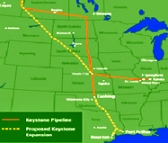TransCanada resubmits Keystone XL application
By CHIP CUMMINS and CAROLYN KING
TORONTO -- TransCanada Corp. said Friday that it resubmitted an application for a US permit for its controversial Keystone XL oil pipeline expansion, rejected by the White House earlier this year after it became a political flashpoint ahead of this year's presidential election.
The Calgary-based pipeline company said it will supplement its application, which was submitted to the US Department of State, with a proposed, alternative route in Nebraska as soon as that route is selected.
Nebraska became the focal point of some of the most vocal opposition to the line.
 TransCanada has long maintained it planned to resubmit its application. US President Barack Obama rejected the line after Republican lawmakers imposed an early deadline on the decision, part of a broader tax compromise with the president.
TransCanada has long maintained it planned to resubmit its application. US President Barack Obama rejected the line after Republican lawmakers imposed an early deadline on the decision, part of a broader tax compromise with the president.
The reapplication doesn't likely change the timing of an ultimate decision on the project.
The White House said it would welcome a resubmission, but because of the time required to process and review a new application, a decision isn't expected until after the November presidential elections.
In a statement Friday, the White House acknowledged receipt of the application and said it was "committed to conducting a rigorous, transparent and thorough review."
Canada's government and Canadian producers have pushed hard for the expansion. Canadian oil production has soared, but pipeline capacity out of oil-rich, but landlocked, Alberta is limited.
The line has divided Washington. Many environmentalists and Democrats have criticized it for furthering American dependence on fossil fuels, especially since much of the fresh Canadian oil the line would bring would come from Canada's oil-sands industry.
Oil sands, essentially bitumen mixed with quartz sand, takes more energy and thus produces a higher carbon footprint, by many measures, than conventional drilling.
Canadian officials and executives counter that the industry is one of the most highly regulated in the world and has comparable greenhouse-gas emissions to many other types of crude around the world.
US Republicans have rallied around the line, saying it will bolster energy security and create jobs. Republicans have portrayed the White House rejection ahead of the US presidential election in November as a missed opportunity to aid the economy.
The White House has defended its decision, saying it didn't have time to adequately review the line after Republicans insisted on an accelerated review earlier this year. Obama invited TransCanada to reapply.
TransCanada said its resubmitted application builds on three years of environmental review.
"It was the most comprehensive process ever for a cross-border pipeline and that work should allow our cross border permit to be processed expeditiously," said Russ Girling, TransCanada's chief executive, in a statement Friday.
TransCanada said the line was "in the national interest of the United States." The company said shipping interest on the proposed line was strong both from Canadian producers and those in the US.
American production in the Midwest has also grown sharply recently, and Keystone XL would transport US-produced oil to the Gulf Coast, as well as Canadian crude.
TransCanada expects to begin construction of Keystone XL in the first quarter of next year, with completion slated for as early as late 2014, if approved.
TransCanada has said it will move ahead with a shorter segment of the line - from Cushing, Okla., to the US Gulf Coast - which doesn't need Washington approval. That segment should start pumping by late next year, the company said.
Dow Jones Newswires






Comments